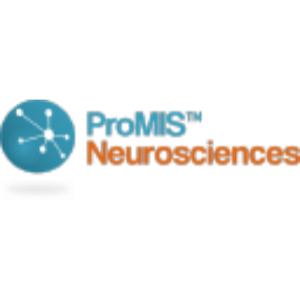ProMIS Neurosciences Announces Publication on Novel Target for ALS
Study results published in Acta Neuropathologica Communications support targeting of RACK1 as a potential therapeutic approach for Amyotrophic Lateral Sclerosis (ALS) and Frontotemporal Lobar Degeneration (FTLD).
TORONTO, Ontario and CAMBRIDGE, Massachusetts, Dec. 20, 2023 (GLOBE NEWSWIRE) -- ProMIS Neurosciences Inc. (Nasdaq: PMN), a biotechnology company focused on the generation and development of antibody therapeutics targeting toxic misfolded proteins in neurodegenerative diseases such as Alzheimer’s disease (AD), amyotrophic lateral sclerosis (ALS) and multiple system atrophy (MSA), today announced a publication identifying Receptor for Activated C-Kinase 1 (RACK1) as a novel misfolded protein target for ALS and frontotemporal lobar degeneration (FTLD). The article published in the online edition of Acta Neuropathologica Communications is titled, "Targeting RACK1 to alleviate TDP-43 and FUS proteinopathy-mediated suppression of protein translation and neurodegeneration."
“We are particularly pleased to have our data published in this well-regarded, peer-reviewed journal and contribute to the growing body of scientific knowledge on the pathogenic role of misfolded proteins in neurodegenerative diseases,” said Gail Farfel, Ph.D., Chief Executive Officer of ProMIS Neurosciences. “In addition, these data on RACK1 deliver another target for our pipeline as we advance clinical development of our lead product, PMN310, for Alzheimer’s disease.”
TAR DNA-binding protein 43 (TDP-43) and Fused in Sarcoma/Translocated in Sarcoma (FUS) are ribonucleoproteins associated with pathogenesis of ALS and FTLD. Under normal conditions, TDP-43 and FUS are predominantly localized in the nucleus of cells, where they participate in the regulation of protein expression. In disease, however, they typically become mislocalized in the cytoplasm of neurons where they form aggregates. The study authors reported that pathological FUS and TDP-43 both co-aggregate with RACK1 resulting in suppression of protein synthesis. Importantly, they showed that removal (knock-down) of RACK1 can restore protein synthesis in a cell system and alleviate neurodegeneration in a fruit fly model of disease.
“These study results provide an important contribution to our understanding of ALS/FTLD molecular pathology and continue to validate our approach of targeting misfolded proteins as a therapeutic strategy that translates across neurodegenerative diseases,” said Neil Cashman, M.D., Chief Scientific Officer and Co-founder of ProMIS.
The complete article can be accessed online here.
About ProMIS Neurosciences Inc.
ProMIS Neurosciences Inc. is a clinical stage biotechnology company focused on generating and developing antibody therapeutics selectively targeting toxic misfolded proteins in neurodegenerative diseases such as Alzheimer’s disease (AD), amyotrophic lateral sclerosis (ALS) and multiple system atrophy (MSA). The Company’s proprietary target discovery engine applies a thermodynamic, computational discovery platform - ProMIS™ and Collective Coordinates - to predict novel targets known as Disease Specific Epitopes on the molecular surface of misfolded proteins. Using this unique approach, the Company is developing novel antibody therapeutics for AD, ALS and MSA. ProMIS has offices in Toronto, Ontario and Cambridge, Massachusetts.
Forward-Looking Statements
This press release contains forward-looking statements that are made pursuant to the safe harbor provisions of the Private Securities Litigation Reform Act of 1995. Certain information in this news release constitutes forward-looking statements and forward-looking information (collectively, “forward-looking information”) within the meaning of applicable securities laws. In some cases, but not necessarily in all cases, forward-looking information can be identified by the use of forward-looking terminology such as “plans”, “excited to”, “targets”, “expects” or “does not expect”, “is expected”, “an opportunity exists”, “is positioned”, “estimates”, “intends”, “assumes”, “anticipates” or “does not anticipate” or “believes”, or variations of such words and phrases or state that certain actions, events or results “may”, “could”, “would”, “might”, “will” or “will be taken”, “occur” or “be achieved”. In addition, any statements that refer to expectations, projections or other characterizations of future events or circumstances contain forward-looking information. Specifically, this news release contains forward-looking information relating to the Company's expectations regarding its clinical development of its lead product, PMN310, for Alzheimer’s disease. Statements containing forward-looking information are not historical facts but instead represent management's current expectations, estimates and projections regarding the future of our business, future plans, strategies, projections, anticipated events and trends, the economy and other future conditions. Forward-looking information is necessarily based on a number of opinions, assumptions and estimates that, while considered reasonable by the Company as of the date of this news release, are subject to known and unknown risks, uncertainties and assumptions and other factors that may cause the actual results, level of activity, performance or achievements to be materially different from those expressed or implied by such forward-looking information, including, but not limited to, the Company’s ability to fund its operations and continue as a going concern, its accumulated deficit and the expectation for continued losses and future financial results. Important factors that could cause actual results to differ materially from those indicated in the forward-looking information include, among others, the factors discussed throughout the “Risk Factors” section of the Company's most recently filed annual information form available on www.SEDAR.com, in Item 1A of its Annual Report on Form 10-K for the year ended December 31, 2022 and the section entitled “Risk Factors” in its Post-Effective Amendment No. 1 to Form S-1, filed March 17, 2023, each as filed with the Securities and Exchange Commission, and subsequent quarterly reports. Except as required by applicable securities laws, the Company undertakes no obligation to publicly update any forward-looking information, whether written or oral, that may be made from time to time, whether as a result of new information, future developments or otherwise.
For further information:
Visit us at www.promisneurosciences.com
Please submit media inquiries to info@promisneurosciences.com.
For Investor Relations, please contact:
Stern Investor Relations
Anne Marie Fields, Managing Director
annemarie.fields@sternir.com
Tel. 212-362-1200








